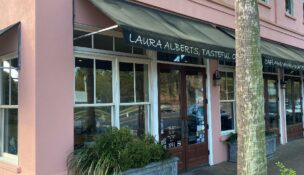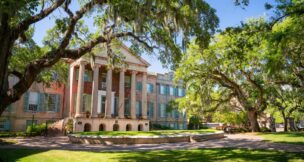Task force exploring potential changes to Charleston hotel regulations
Staff //May 27, 2019//
As developers continue to line up at the Board of Zoning Appeals to receive approvals for hotels, the city of Charleston is taking a close look at its accommodations zoning ordinance to determine whether the regulations still meet the needs of the growing Holy City.
“The book is open; it’s a clean slate,” Mayor John Tecklenburg told the city’s newly formed hotel task force at its first meeting earlier this month. “Everything is open for discussion. Any ideas you have that you think would put Charleston in a better place in terms of hotel development is worthy of consideration.”
Click for interactive map of hotels
Downtown Charleston had nearly 7,500 hotel rooms as of April 2019, according to city staff. As Charleston City Council prepares to receive recommendations from its hotel task force on how to amend the city's accommodations regulations, the Business Journal has begun mapping every hotel that currently exists and the hotels that have been approved by the Board of Zoning Appeals. This map will continue to be updated as more hotels are approved and built.
Is this map missing a hotel? Email phoff@scbiznews.com.
The 11-member task force was created after Tecklenburg introduced an ordinance last month to give the Board of Zoning Appeals more power by strengthening the city’s accommodations ordinance. Members include city council members, community advocates and leaders in the hospitality industry.
District 1 Councilman Gary White Jr., who’s running for mayor, said a task force like this should’ve happened 3 1/2 years ago.
“I had already spoken to all of the groups that I feel like are stakeholders, and they’re all singing off the same hymnal,” he said. “The difference is in the nuances of language. And you can only accomplish understanding and getting the language correct that everybody can agree on by having everybody at the table.”
Leonard Krawcheck, chair of the zoning board, has said he feels the Board of Zoning Appeals has no choice but to approve new hotel developments based on the language of the current ordinance.
“What has happened is we’ve seen a proliferation of hotels in downtown Charleston and we don’t have any discretion,” Krawcheck said.
“What we’ve turned into in terms of hotels — which is unlike everything else that we do on the board or almost everything else — is a rubber stamp.”
‘A tourist hub that just has tourism’
According to the Charleston Planning Department, 4,920 hotel rooms were built or had full approval to be built downtown as of Dec. 31. Planning Director Jacob Lindsey said his department anticipates 2,578 more rooms to be added in the next several years either because they’ve started the approval process or his staff has reason to believe they will soon.
In 1980, the peninsula had 1,085 hotel rooms.
Downtown Charleston has 13.2 hotel rooms per 100 people, which Lindsey said is a good ratio because it places the peninsula between Boston, with 9 hotel rooms per 100 residents, and San Francisco, with 15 rooms per 100 residents.
With all of the anticipated hotel rooms, though, Lindsey said downtown Charleston would have 20 rooms per 100 residents, the same number as Savannah, which Krawcheck said he doesn’t view as a city with a mixed-use downtown.
“We believe that we are at or we … probably have already passed the tipping point in terms of the number of hotel rooms per resident in our city center to maintain the balance and diversity that is typical of a vibrant place,” Lindsey said. “We don’t want to become a tourist hub that just has tourism.”
Currently, a property on the peninsula must be commercially zoned and inside the city’s accommodations overlay, or City Council must place it inside the overlay, before it’s allowed to be used for a hotel. Developers then must receive an accommodations special exception from the Board of Zoning Appeals, architectural approval from the Board of Architectural Review and evaluation from the city’s Technical Review Committee before construction can begin.
For most developers, Lindsey said, the process takes two to three years. Although most current hotels are within the overlay, some are not, either because they predate the regulation or because they obtained an exception from City Council.
Hotels typically are limited to a certain number of rooms depending on the property’s location within the overlay. But if it is in the area bounded by King, Meeting, Mary and Line streets and it provides meeting and conference space and an on-site restaurant, it can have unlimited rooms as a “full-service hotel.”
Winslow Hastie, president and CEO of Historic Charleston Foundation and a member of the task force, said the “full-service” district was originally created because the Charleston Area Convention & Visitors Bureau saw a need for more convention-style hotels to compete with Belmond Charleston Place.
The accommodations overlay encompasses 567 parcels of land, Lindsey said, with 51 in the full-service district.
According to the Charleston County Tax Assessor’s Office and the city of Charleston, the accommodations overlay currently includes 1.3 million square feet of office space and more than 2,600 jobs.
Lindsey said the accommodations overlay, first codified in the 1980s and made smaller thrice since, is working the way it’s supposed to, concentrating the downtown hotels in the city center so that visitors can park their cars and enjoy Charleston by foot.
“We created a system that concentrates tourists in our city center, and that was crafted for a time when that’s what we needed,” Lindsey said. “And today, I think we look at if that’s still what we need.”
‘Pushing and pulling’
The Planning Department’s proposed changes, presented at the first hotel task force meeting, include strengthening the powers of the Board of Zoning Appeals, creating a provision for minimum rooms, and creating a maximum room cap and more stringent requirements for the full-service hotels near Upper King Street.
The goal, Lindsey said, is maintaining a diversity of uses by protecting retail, offices and residences from being displaced.
Perrin Lawson, deputy director of the Charleston Area Convention & Visitors Bureau, said the task force also needs to look at diversity within the hotel industry.
“What we do actually need, though, is some full-service hotels,” he said. “Not 500, not 700 rooms, but 200, 250. Personally, I think a lot of people would much rather see one 250-room hotel with 20,000, 30,000 square feet of conference space that would … provide a civic purpose.”
The task force has held three meetings, each running at least 90 minutes; one included a line-by-line review of the Planning Department’s proposed ordinance led by Frances Cantwell, former corporation counsel for Charleston.
Kristopher King, executive director of the Preservation Society of Charleston, said he thinks the task force is on the right track.
“The conversation has certainly gotten down to the nuts and bolts a lot more quickly,” he said. “And I think the positive takeaway that I really heard from multiple folks walking out of this — you know, everyone in the room clearly seems to agree that the way it’s working right now is problematic and there are definitely improvements that we can make that will hopefully benefit Charleston a long way.”
Hastie said Historic Charleston Foundation is concerned about the full-service hotel district because it allows an unlimited number of rooms and the definition of “full-service” is not clear.
“There are so many sites that could potentially become … large hotels,” Hastie said. “And the reality is the market is tilting in that direction.”
One large hotel development that recently passed the Board of Zoning Appeals is 431 Meeting St., a 252-room hotel on a piece of property currently owned by the Charleston School of Law. Historic Charleston Foundation is appealing the board’s decision in circuit court.
Hastie said he’s not opposed to hotels but said downtown Charleston is lacking office space.
“We have to make sure there’s going to be a vibrant sort of midtown zone that’s dense but vibrant with a diversity of uses,” he said. “And that’s what’s going to make us very successful for the long term.”
King concurred with Lindsey that one of his biggest concerns is protecting offices, retail and residences from being pushed out.
“But I also think that it’s critically important that we understand that we should be driving towards quality,” he said. “Hotels do put some burdens and stresses on the community, and so it’s sort of giving back in the same way, offering amenities that people who live here have the opportunity to utilize as well.”
District 8 Councilman Mike Seekings, who’s running for mayor, said he’d like to take apart the accommodations overlay and examine downtown property by property, allowing City Council to designate more precisely where hotels should and shouldn’t be.
“I just think we’re only getting through half of it,” he said, adding, “I think the overlay zone is going to become obsolete and we don’t need it anymore. It’s done its job — it focused and concentrated the hotels.”
Tecklenburg, Seekings and District 6 Councilman William Dudley Gregorie have each also said they want to see any new accommodations regulations protect, if not create, affordable housing.
“I don’t want a net loss of affordable housing,” Gregorie said.
The task force plans to present its recommendations to City Council on May 28, though several task force members have expressed reservations about that deadline.
“I think as you have a group of fairly diverse representation sort of looking at the hotel issue and pushing and pulling on the ordinance and how it’s going to be applied, I feel like having a sort of arbitrary date deadline seems to be sort of counterintuitive when we’re starting to have a fairly productive and healthy conversation,” King said.
Seekings said the task force doesn’t want to bring anything “half baked,” and he said he doesn’t get the sense that the task force sees the May 28 deadline as a hard stop.
“This task force is moving towards resolution that is to the benefits of the residents of this community,” Seekings said. “It won’t be perfect, but it’s going to be fair.”
King said he hopes the discussion about hotel development leads to a bigger discussion about development in downtown Charleston, including considerations of traffic, parking and rooftop bars, as well as how development plans change between one approval step and the next.
“We’ve got to look on a macro level for every type of project that’s going on in downtown Charleston,” he said. “So my hope is that … we’ve identified five or six good points. Let’s make sure we follow up on that as well.”
This story originally appeared in the May 27, 2019 print edition of the Charleston Regional Business Journal.
-















